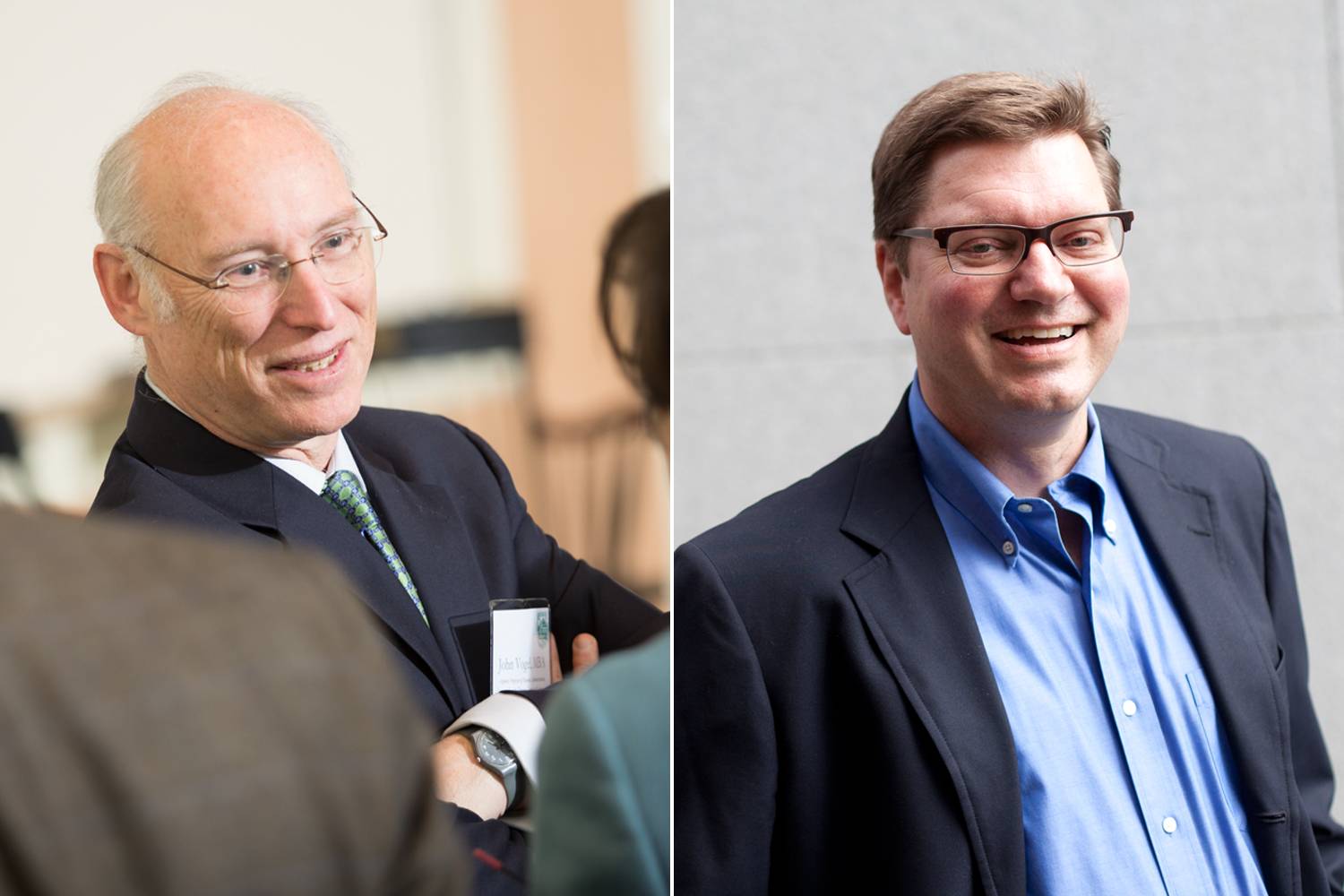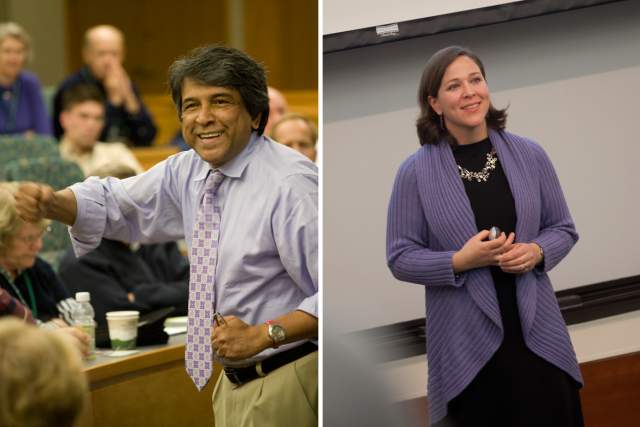Bernard and Vogel Receive 2017 Teaching Excellence Awards
Students lauded the veteran professors for being rigorous yet personable, and making their courses relevant to business practice and life in general.

Per Tuck tradition, Vogel and Bernard will deliver the “Last Lecture” on Friends and Family Day, Friday, June 9.
The Tuck Class of 2017 has announced this year’s winners of the annual Teaching Excellence Awards.
In the core curriculum, students selected Andrew Bernard, the Jack Byrne Professor of International Economics, for his course Global Economics for Managers (GEM). In the elective category, students chose Adjunct Professor John Vogel, who teaches the Real Estate course.
The Teaching Excellence Awards were set up by the Class of 2011 to “celebrate the learning environment at Tuck by honoring the faculty who, in the eyes of their students, have made an outstanding contribution to the quality of the educational experience.” Each year, an academic representative from the graduating class surveys his or her classmates about their favorite teachers and meets with a committee to examine the comments and data and select the winners.
Here are two comments that represent how students speak of Bernard and Vogel:
“Professor Bernard conducts class the way it should be taught, challenging students to think critically about global affairs and case work and encouraging participation that enhances learning instead of regurgitation of material. It is a difficult balance, but the Tuck core is much stronger as a result of his style.”
“Professor Vogel’s real estate course was one of the best electives I took at Tuck. It was varied in its exercises and application, mixing both clear instruction with a variety of interesting practitioners. Professor Vogel ensured that a student could both enjoy his class as a casual, eventual buyer of a home—as well as a serious investor or developer in the future. His teaching career at Tuck is one worth celebrating.”
Bernard co-created GEM with former Tuck professor Mike Knetter in the winter of 1999, the same year Bernard began teaching at Tuck. It covers three main topics: international trade, macroeconomics, and firms and exchange rates. Students are given weekly memorandums on readings, which are typically a chapter from their textbook, written specifically for GEM, and articles from The Economist, the New York Times, the Wall Street Journal, or the Financial Times. “We designed this course, which is completely different from any other international economics course in the world, to teach these concepts to MBAs in light of what they know and how they think,” Bernard says. For example, the students take GEM after they’ve taken Accounting, so when Bernard covers monetary policy he starts with the balance sheet of the Federal Reserve. “It just makes it much simpler for them,” Bernard explains, “even though for any other group it would probably make it more complicated.”
The classroom experience in Bernard’s course is known to be intense. Every student is cold-called at least twice in the first two weeks, and students must constantly question what they truly know. But Bernard’s sense of humor keeps the course fun. “I’m not known as Dr. Evil for nothing,” he jokes.
After class students should be able to pick up the Wall Street Journal or the Financial Times and think critically about what’s being said.
While GEM is now 17 years old, the concepts and ideas in the course are timeless, and they can be overlaid onto current events seamlessly. When the Class of 2017 took the course in the winter of 2016, they talked about the presidential election and the differences in fiscal policies among the candidates, the state of the U.S. economy, monetary policy, and the likelihood of the Federal Reserve raising interest rates. “For me, the pleasure of this class is taking a whole group of students and making current events much more transparent,” Bernard says. “At the end of the class they should be able to pick up the Wall Street Journal or the Financial Times and be able to think critically about what’s being said there.”
Vogel brings a similar relevance to his Real Estate course, which he has taught at Tuck for 25 years. He knows that most of his students will not go on to careers in real estate, “so I’m not teaching them the nuts and bolts of how to develop a one-million-square-foot building,” he says. “I’m trying to get them to think about this particular asset class, its unique features, and how to think about investments.”
I’m not teaching them the nuts and bolts of developing a one-million-square-foot building, I’m trying to get them to think about a particular asset class, its unique features, and how to invest.
Vogel came to Tuck after a diverse career in the real estate industry. It started after college when his great aunt, a land use expert, asked him to co-author a book with her about the New Town Movement which seemed to be taking off in the 1970s. That led him into construction and then to Harvard Business School, where he got his MBA and then worked as an associate fellow in Real Estate. After Harvard, Vogel became one of the 14 founders of Copley Real Estate Advisors, taught real estate at Yale, and then became the executive director of the Neighborhood Development Corporation of Jamaica Plain, where he helped bring affordable housing and jobs to inner city Boston.
In keeping with his practical approach to teaching real estate, on the first day of class Vogel presents his students with a framework for analyzing a potential real estate investment. It starts with asking questions about the site and the location, then the product and market, the financing and regulations, and finally the capability of the team of people involved. Each question is meant to impose order and predictability on the notoriously risky act of real estate development, but Vogel is sure to acknowledge the role of the unknown. “The last question in the framework is: are you feeling lucky?” he says.
The classroom sessions get at these questions through case studies. Vogel has written about two-thirds of the cases in the course and adds two or three new cases each year. About one-half of the classes feature guest speakers who are also the protagonists in the case. “So when we’re discussing what to do in this situation, you have the guest themselves in the classroom to comment on what the students think, and inform them about what they did and why they did it.” In these 18 cases, students are exposed to a variety of problems and solutions, and start to see how sophisticated practitioners dealt with challenging situations. In other words, Vogel says, “they build up a pretty good sense of the challenging territory called real estate, how to navigate it, and how to solve problems.”
Vogel retires this summer, with plans to travel to Rawabi, Palestine in August to teach a course on basic business practices; he has been involved in promoting the planned city in Palestine. He and wife Judy Music live in Norwich, Vermont.
As has become the tradition, Bernard and Vogel, as the recipients of the Teaching Excellence Awards, will deliver the “Last Lecture” on Friends and Family Day on Friday, June 9.
Previous winners of the Class of 2011 Teaching Excellence Award include Emily Blanchard, associate professor of business administration; Anant Sundaram, visiting professor of business administration; Praveen Kopalle, the Signal Companies Professor of Management and associate dean for the MBA Program; Daniel Feiler, assistant professor of business administration; Giovanni Gavetti, associate professor of business administration; Chris Trimble, adjunct associate professor of business administration; Andrew King, professor of business administration; Scott Neslin, the Albert Wesley Frey Professor of Marketing; Matthew J. Slaughter, the Paul Danos Dean of the Tuck School and the Earl C. Daum 1924 Professor of International Business; Joseph Hall, visiting professor of business administration; Phillip Stocken, professor of accounting; and Ron Adner, the David T. Mclaughlin D’54, T’55 Professor.

